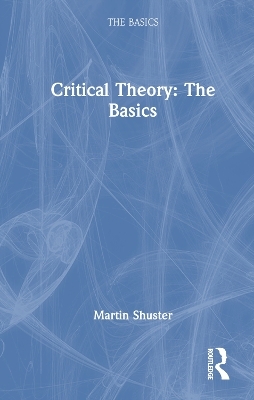
Critical Theory: The Basics
Seiten
2024
Routledge (Verlag)
978-1-032-06155-9 (ISBN)
Routledge (Verlag)
978-1-032-06155-9 (ISBN)
Critical Theory: The Basics is an ideal starting point for anyone seeking an accessible but robust introduction to the richness and complexity of this tradition and to its continuing importance today.
Critical Theory: The Basics brings clarity to a topic that is confusingly bandied about with various meanings today in popular and academic culture.
First defined by Max Horkheimer in the 1930s, “critical theory” now extends far beyond its original German context around the Frankfurt School and the emergence of Nazism. We now often speak of critical theories of race, gender, anti-colonialism, and so forth. This book introduces especially the core program of the first-generation of the Frankfurt School (including Horkheimer, Theodor W. Adorno, Erich Fromm, and Herbert Marcuse), and shows how this program remains crucial to understanding the problems, ideologies, and systems of the modern world, including capitalism, racism, sexism, and the enduring problems of colonialism. It explores basic questions like:
What is critical theory?
What can critical theory be? What should it be?
Why and how does critical theory remain vital to understanding the contemporary world, including notions of self, society, politics, art, religion, culture, race, gender, and class?
With suggestions for further reading, this book is an ideal starting point for anyone seeking an accessible but robust introduction to the richness and complexity of this tradition and to its continuing importance today.
Critical Theory: The Basics brings clarity to a topic that is confusingly bandied about with various meanings today in popular and academic culture.
First defined by Max Horkheimer in the 1930s, “critical theory” now extends far beyond its original German context around the Frankfurt School and the emergence of Nazism. We now often speak of critical theories of race, gender, anti-colonialism, and so forth. This book introduces especially the core program of the first-generation of the Frankfurt School (including Horkheimer, Theodor W. Adorno, Erich Fromm, and Herbert Marcuse), and shows how this program remains crucial to understanding the problems, ideologies, and systems of the modern world, including capitalism, racism, sexism, and the enduring problems of colonialism. It explores basic questions like:
What is critical theory?
What can critical theory be? What should it be?
Why and how does critical theory remain vital to understanding the contemporary world, including notions of self, society, politics, art, religion, culture, race, gender, and class?
With suggestions for further reading, this book is an ideal starting point for anyone seeking an accessible but robust introduction to the richness and complexity of this tradition and to its continuing importance today.
Martin Shuster is Professor of Philosophy and the Isaac Swift Distinguished Professor of Jewish Studies at the University of North Carolina at Charlotte. In addition to many journal articles, public essays, and edited volumes, he is the author of Autonomy after Auschwitz: Adorno, German Idealism, and Modernity (2014), New Television: The Aesthetics and Politics of a Genre (2017), and How to Measure a World? A Philosophy of Judaism (2021).
Introduction: Suffering 1. Critique 2. Self 3. Society 4. Art 5. Religion Conclusion: Philosophy, Critical Theory and the Present Bibliography Index
| Erscheinungsdatum | 29.05.2024 |
|---|---|
| Reihe/Serie | The Basics |
| Verlagsort | London |
| Sprache | englisch |
| Maße | 129 x 198 mm |
| Gewicht | 607 g |
| Themenwelt | Kunst / Musik / Theater |
| Geisteswissenschaften ► Philosophie | |
| Geisteswissenschaften ► Psychologie ► Allgemeine Psychologie | |
| ISBN-10 | 1-032-06155-3 / 1032061553 |
| ISBN-13 | 978-1-032-06155-9 / 9781032061559 |
| Zustand | Neuware |
| Haben Sie eine Frage zum Produkt? |
Mehr entdecken
aus dem Bereich
aus dem Bereich
Techniken der Verhaltenstherapie
Buch (2024)
Julius Beltz GmbH & Co. KG (Verlag)
35,00 €


